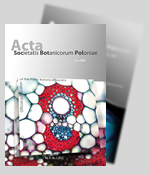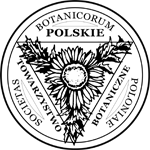Abstract
Oilseed rape plants responded to water and salt stresses (-0.5 MPa, PEG 6000 and NaCI) by reduction of the fresh and dry weights of shoots and roots. When PEG was used, the ratio of dry weights of roots:shoots surpassed that of controls. The leaf protein content increased considerably. The phosphorus content decreased only in the roots, most significantly after three days of stress. Immediately after the stresses were induced, an increase in the acid phosphatase (AP) activity was noted. Water and salt stresses caused four- and two-fold increases in AP activity in leaves, respectively. Changes in the enzyme activity were negligible in stems and roots. There are nine forms of AP in young leaves of oilseed rape. In the stressed plants, from No. 5 revealed lower activity and forms Nos 8 and 9, higher activities than in the control. The increase in AP activity was directly accompanied by the decrease in the water potential of the tissues. Oilseed rape is considerably less sensitive to salt stress than to water stress, which is manifested as the lower inhibition of plant growth and also by a smaller increase in acid phosphatase activity.
Keywords
oilseed rape; acid phosphatase; water and salt stresses







